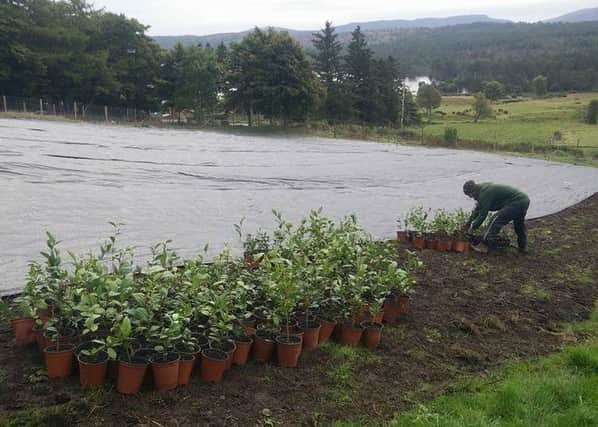Farmer sets up UK's most northerly tea plantation


Lucy Williams and a team of five planters worked through the rain last week to get 1,500 plants into the ground at her croft in the Highlands.
They have chosen Camellia Sinensis, one of the hardiest breeds, which can withstand prolonged periods below -15C, and say the first crop should be ready for Christmas.
Advertisement
Hide AdAdvertisement
Hide AdMs Williams runs Tulloch Tea with her husband Chris, a forester, on a 1.6 acre site at Bonar Bridge, Sutherland.
They are among a dozen Scottish growers who are now cultivating posh tea for discerning drinkers.
Ms Williams said: “A team of five planters worked through rainy weather to get the plants into the ground.”
The couple are being supported by the Scottish Tea Growers Association (STGA) and also Scotland’s first tea producer Tam O’Braan who runs the Wee Tea Plantation at Dalreaoch Farm Estate, Amulree, Perthshire.
Mr O’Braan specially bred and hardened the Tulloch plants to withstand the vagaries of the Scottish climate. He has 14,000 plants at his former sheep farm and sells his premium tea to Fortum and Mason
The couple are part of a growing new tea industry in Scotland, with around 12 established growers currently selling worldwide and more coming on stream.
The vulnerable Camellia Sinensis have been planted in terram to keep the weeds down with woodchip around the base. They will be grown in shrub guards with fleece collars over the top of the guard.
Ms Williams said: “We expect to have the first tea samples ready for Christmas with a larger crop next summer.”
Advertisement
Hide AdAdvertisement
Hide AdThe couple are aiming to produce premier, single estate loose-leaf tea.
Ms Williams said: “The needle at the top and the two top leaves are called the premier leaf and are the most sought-after part. Those will probably be sold overseas and to high-end hotels.”
Ms Williams also plans to use the secondary leaf to develop a range of goats’ milk soap infused with Scottish tea.
It is hoped that their picturesque, hillside croft will become part of a “tea trail” with visitors offered a “tea experience” including a tour of the plantation and tea tasting as well as an opportunity to purchase unique beauty products.